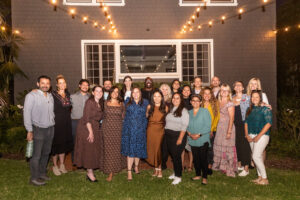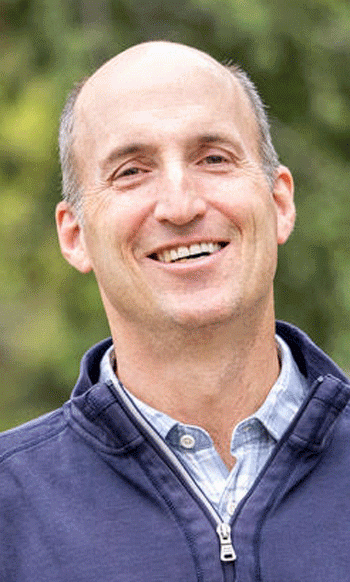Published by: CYNDER SINCLAIR, NOOZHAWK COLUMNIST Noozhawk article Many people dream of transforming their community.…
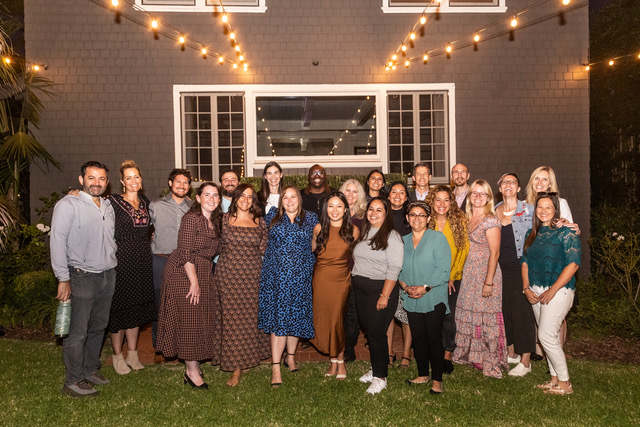
Mentors and Allies: An Exploration with the Katherine Harvey Fellows
Reflections from Ed France
People hate politics. Yet for any of us interested to advance a policy or initiative or community cause, it is a necessary evil. Further, we have so far to go to make our governance more accessible, understandable, inclusive. It’s how our community and political system meaningfully overlaps. Despite twenty years and countless committees of public service that I’ve engaged in, I never before experienced discussion that got at this theme like was hosted in our Leading From Within convening space this September.
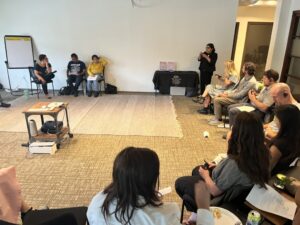
I joined a session of the Katherine Harvey Fellows cohort that just completed their year long experience together. It is one of our four leadership development programs and experimented with new, participant led curricula this year. The two sessions offered that day took on so many levels of public engagement and community advocacy, bringing the themes of inclusive governance to a whole new level. It started by, for the first time in my life, using a live translation headset.
I was out of my element. Along with our Katherine Harvey Fellows cohort, I listened in to my headset humming with simultaneous translation of Spanish speaking community organizers from MICOP and CAUSE. Jorge and Ziola were often translating or representing their constituencies in public hearings only to be translated again, such as translating from Mixtecto to Spanish to English and back again. We were learning directly not only of their stories of allies and mentorship and policy victories through hardship, but also the experience of being one step removed from the primary conversation and persevering to make their case heard.
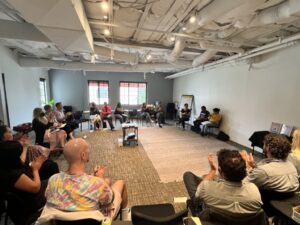 My mind was working harder than in any of the hundreds of public hearings I’ve attended. Even as a proficient Spanish speaker, my toggling between the translation and live spanish struggled. My question to the speakers, articulate in my own mind, fell flatly. Despite the quality live translation of our bridging voices translator, I get a feeling of the challenges of language accessibility. What a valuable learning experience developed by and for the KHF cohort, matched by the valuable insights of two community organizers with forty years of experience between them.
My mind was working harder than in any of the hundreds of public hearings I’ve attended. Even as a proficient Spanish speaker, my toggling between the translation and live spanish struggled. My question to the speakers, articulate in my own mind, fell flatly. Despite the quality live translation of our bridging voices translator, I get a feeling of the challenges of language accessibility. What a valuable learning experience developed by and for the KHF cohort, matched by the valuable insights of two community organizers with forty years of experience between them.
One funny story did come across quite well. Jorge Toleando shared about his early organizing experience where he wasn’t quite meeting expectations. After arriving late and failing to secure the venue for a community meeting, his mentor quipped ‘Don’t tell anybody that I’m your mentor, I don’t want them to think this is my guidance.” As Jorge found his footing and discipline in holding space for community work his mentor’s tone changed: I hope they all know that I’m the one whose mentored you.”
As the story illustrates, mentorship as theme number 1 meant not just receiving advice but living up to expectations. Allies in advocacy for underrepresented groups, like non-English speakers, was theme number 2. These themes independently arised in the program that is dedicated to mentorship and creating allies across sectors, and spoke to the importance of the work we are doing to support a vibrant, inclusive civic society.
After a short break, The group returned for it’s next pair of speakers, both reflecting on the government commission or board service. This was more my language; Robert’s rules of order, bureaucracies and 1:1 political lobbying. What does it take to serve the public in these policy arenas? The theme of mutual respect amongst potential political adversaries shined. Megan Turley shared the trust she built as Vice Chair of the Redistricting committee for the county with the Chair, whose political views couldn’t have been more different. What a refreshing moment amidst our national sense of polarization.
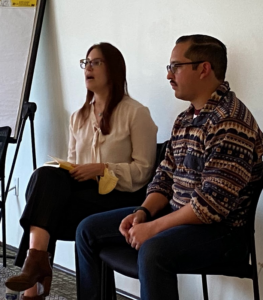 Another key theme was that, yes, you have to win over electeds personally, through relationships. A compelling email or cover letter simply doesn’t cut it. As Gabe Escbedo shared a story about not being selected by City Council for a role despite a well practiced speech and credentials, he highlighted the importance of relational trust.
Another key theme was that, yes, you have to win over electeds personally, through relationships. A compelling email or cover letter simply doesn’t cut it. As Gabe Escbedo shared a story about not being selected by City Council for a role despite a well practiced speech and credentials, he highlighted the importance of relational trust.
Relational trust ends up being a key element of ‘getting things done’ in government, and doing so not just for some, but for all of our community. How apropos for the focus we bring on relational trust and inclusivity in our work at Leading from Within. What an exceptional set of presenters and cohort participant facilitators and what a rich range of civic engagement that was demonstrated in just three hours time.
All this was within a year long journey of leadership and exploration of our social sector through the case study of youth poverty. Experts in public health, various agencies and community organizers paired with mentors and engaged participant groups. This experience renewed my hope in those outside of non-profits stepping up to support our civic life and lift up our community organizations work. Please join me in congratulating the most recent cohort of Katherine Harvey Fellows.
